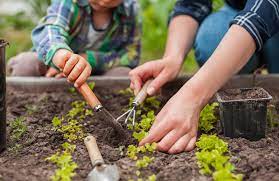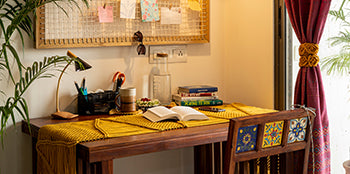What we learned from our grandmothers...
Our sustainability series looks to the past for inspiration and delves into secrets from our favourite guides, grandmothers. Dadi, Nani, Achamma, Aji, Ba… she has many names and she would be the best source for some easy everyday household practices that will help you do your bit for the environment.
In the wake of the pandemic years and an impending climate crisis, we have all become more aware of our impact on the planet. The world is talking about sustainability in new ways, but for many of us, the old ways have made a big comeback, as traditional practices. These practices passed down over generations, are results of economic frugality and, as we slowly realise, are also environmentally sustainable. And what better way to reflect on traditions than to look to our grandmothers, the go-tos of all traditional households.
Let's face it our grandmas ran very tight ships. At the centre of it all was the kitchen, with pickles and chutneys abundant providing natural probiotics for happy digestive systems, and a balanced meal. Curd or dahi was always homemade, carefully set in a designated vessel, enough for the entire household.


The herbs were grown in-house from Karipatta(curry leaves) or meetha neem to Tulsi and mint, the ‘kitchen garden’ was tended to with love and care. Organic kitchen waste and tea leaves became food for these plants. Small simple everyday kitchen habits that most of us would have seen, even if only during summer break.
There’s so much more the kitchen has to offer ranging from cures for colds to concoctions for that perfect glowy skin. A crowd favourite has been besan (gram flour) with milk and a pinch of haldi (Turmeric) for supple skin. Speaking of haldi, never has there been a better cure-all, haldi heals cuts and sore throat, it's an anti-inflammatory and antioxidant, a sure shot grandma pleaser.
How many of us had fresh atta and masalas coming from the chakki??
We have a feeling these candle jars will be a grandma favourite to save for secret storage.
The boxes and bottles from packaged foods were and are still saved, to keep knick-knacks, sewing kits in biscuit tins are just the tip of the iceberg. Some of these dabbas find their way into our travels, never has a grandma travelled without her packed lunches, snacks, sweet treats for the kids and even mukhwaas.

Screen times are a new phenomenon and our grandmas never bothered with it. They have always had things to do, “useful” hobbies that keep one’s hands occupied and minds in a meditative state. There is knitting, stitching, embroidery, crochet and more. Winter gatherings of cute dadis sitting in circles in the precious sunlit hours knitting little sweaters for every single person at home have been a common sight. Handmade is a whole world of nostalgia for most of us.

The most heartwarming sight is one of women coming together and sharing.
Have you worn something made by your grandma??
Not everything needed to be replaced and most things could be fixed. We learned to mend our things and take care of them so they would last for many years, only to be passed on to the younger ones. And whatever was beyond repair would find a new purpose, her oldest softest sarees would become godharis for the newborn, the rest would become totes for grocery shopping.
A huge difference between our grandparents’ generation and us is the availability of brands and the dwindling number of local businesses. But shopping trips to nearby bazaars were ripe learning opportunities, picking the freshest vegetables and the stars of the season, are lessons for a lifetime.
Take our tote along to test drive those early lessons.
So, if you were looking to make changes in your household to more sustainable practices best give grandma a call.
Atta - Any flour is Atta. In North India, just Atta is usually for wheat flour.
Masalas - Ground spices of any kind.
Chakki - Flour mill
Mukhwaas - Mouth freshener made with a mix of natural ingredients like fennel seeds.
Godharis - Blankets made by patching layers of old clothes by hand sewing.

Amisha Bajpai
Design Practitioner, Researcher and Educator
Amisha Bajpai is a trained architect and designer, working with clothing, crafts and culture. An avid explorer of intersectionality in design research, practice and education. She is part of a design studio working closely with artisans in Ahmedabad, India, towards designing textiles, clothing and experiences. Her deep interest in cultures and histories surrounding spaces, textiles and clothing, are the driving forces of her writing endeavors.
People Also Read
SIGN UP TO GET OUR NEWSLETTER
Receive our latest workshop updates, promotions as well as updates on new arrivals. No spam guaranteed!




